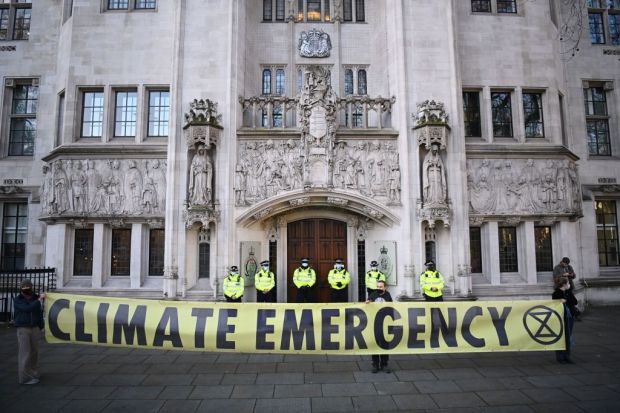Sometimes old grievances are best laid to rest. That was certainly the view of Tony Blair when his government issued nearly 200 ‘comfort letters’ to Irish nationalist gunmen in the wake of the Good Friday Agreement. But a decision by the Northern Ireland High Court on Wednesday will upend that principle, setting back years of compromise and reconciliation.
For some time it has been all but impossible to prosecute IRA men for murders committed during the Troubles. British security forces, however, remain vulnerable, although most are now in their seventies and long retired. One, indeed, died during a trial last year, one suspects partly from the trauma of being dragged through the courts over political events taking place before some of the lawyers involved were born.
Last July, following the collapse of the trial of two other septuagenarians for alleged Troubles offences, the government bit the bullet. It accepted the one-sidedness of the present arrangements and allowed Brandon Lewis to announce an effective legislative amnesty for all pre-Good Friday Agreement offences on both sides. Taking the hint, the Ulster prosecution service discontinued proceedings against six other soldiers it was then pursuing.
The end of a sorry story, perhaps? Unfortunately no. Quite apart from the nationalist howls of anguish that they were losing their useful ability to wrongfoot the British government at any time just by mouthing the words ‘justice for victims’, the promised amnesty legislation has got bogged down, as a frustrated Brandon Lewis was forced to admit to Troubles veterans a couple of weeks ago. And, as if this was not enough, on Wednesday the High Court in Belfast accepted the arguments of republican activists and struck down the decision not to prosecute one veteran, known as Soldier F, as ‘irrational’. There was, it said, a possibility of enough admissible evidence being available to convict him; and, the court added, insufficient reasons had been given to the victims’ relatives under the EU victims’ rights legislation to justify their decision.
Legalities aside, this is very bad news for justice and reconciliation. Immediately after the judgment was announced, social media posts mushroomed, wildly cheering the news and demanding that Soldier F be put on trial as soon as possible. Ghoulish calls like this, demanding the state pursuit of elderly men for things done in his twenties – in the stress of what was essentially civil war – signify not a desire for justice but rather vindictiveness. This decision will reactivate old grievances that might otherwise have faded into history.
Secondly, the mere fact that someone could be prosecuted does not mean he should be. If only in the interests of promoting humanity and the possibility of reformation, we should always be prepared to think twice before we bring stale prosecutions against people who have lived blameless lives for 40 or 50 years. To say such a decision is irrational may be the instinct of lawyers and academics cocooned in the cold, calculating atmosphere of chambers and university offices. But it isn’t how the rest of us look at matters.
Third, all disputes must come to an end sometime. The government’s plan to put a final, non-partisan, termination to the process of sorting out the events of the 1970s and 1980s is ultimately the only rational way forward. Unfortunately, the decision of the High Court throws a monkey-wrench into the whole process by positively encouraging the indefinite raking-over of ancient grievances. This may please the nationalists; indeed, it probably will, since it helps them pursue their aim of harrying the British government in the name of victim’s rights and promoting the idea that there is only one way the dispute can end – their way. But there is no reason the government should be forced to go along with this.
It may well be that the court’s decision is right in law. Even here, however, one might comment that the idea of legal irrationality is a pretty flexible one. One can equally argue, entirely respectably, that courts overreach if they demand that prosecutors emphasise technical rules of evidence and vague euro-legislation on victims’ rights over more general political and humanitarian considerations.
In any case, the government’s duty is now clear. It should, as a matter of principle, appeal the Northern Irish High Court’s decision. In case it loses, however, it must also dig out, fast, the legislation it promised last year for a general amnesty for all on both sides of the Ulster divide. It owes this not only to Soldier F but to the people of Ulster, and for that matter to the United Kingdom as a whole.
Got something to add? Join the discussion and comment below.
Get 10 issues for just $10
Subscribe to The Spectator Australia today for the next 10 magazine issues, plus full online access, for just $10.



















Comments
Don't miss out
Join the conversation with other Spectator Australia readers. Subscribe to leave a comment.
SUBSCRIBEAlready a subscriber? Log in